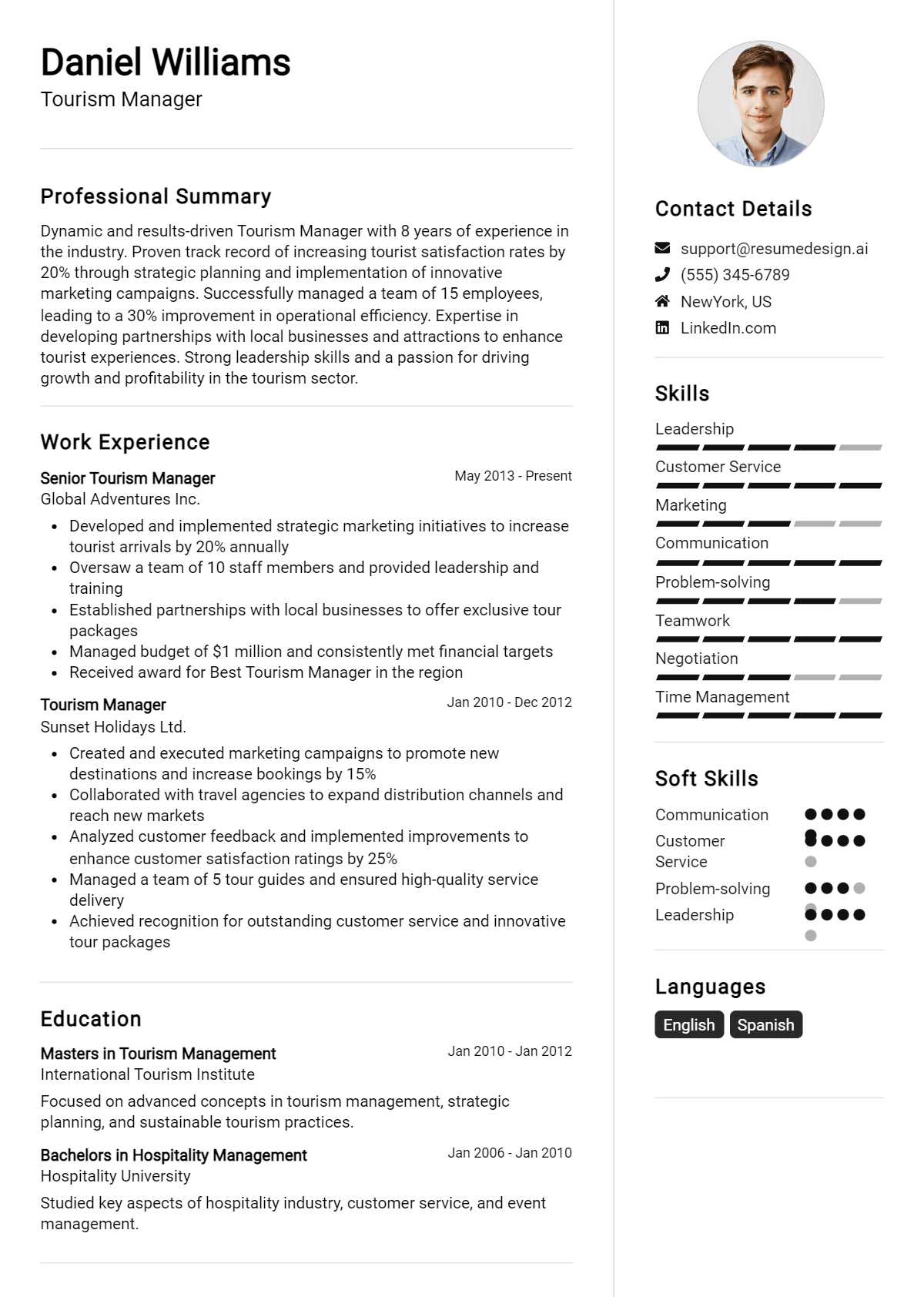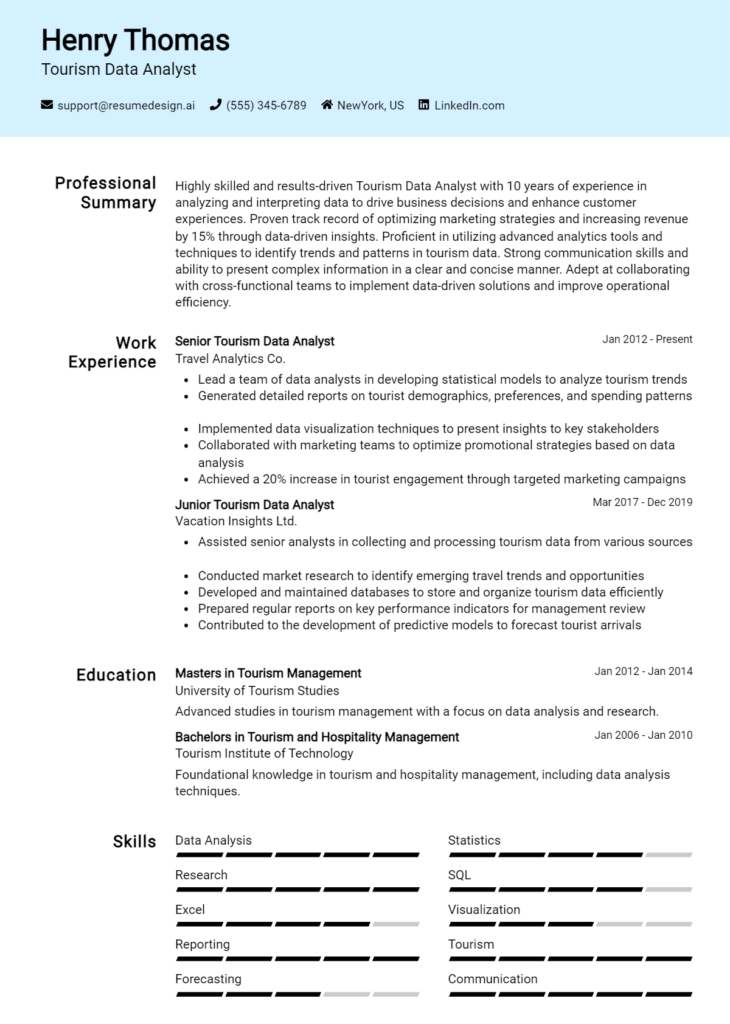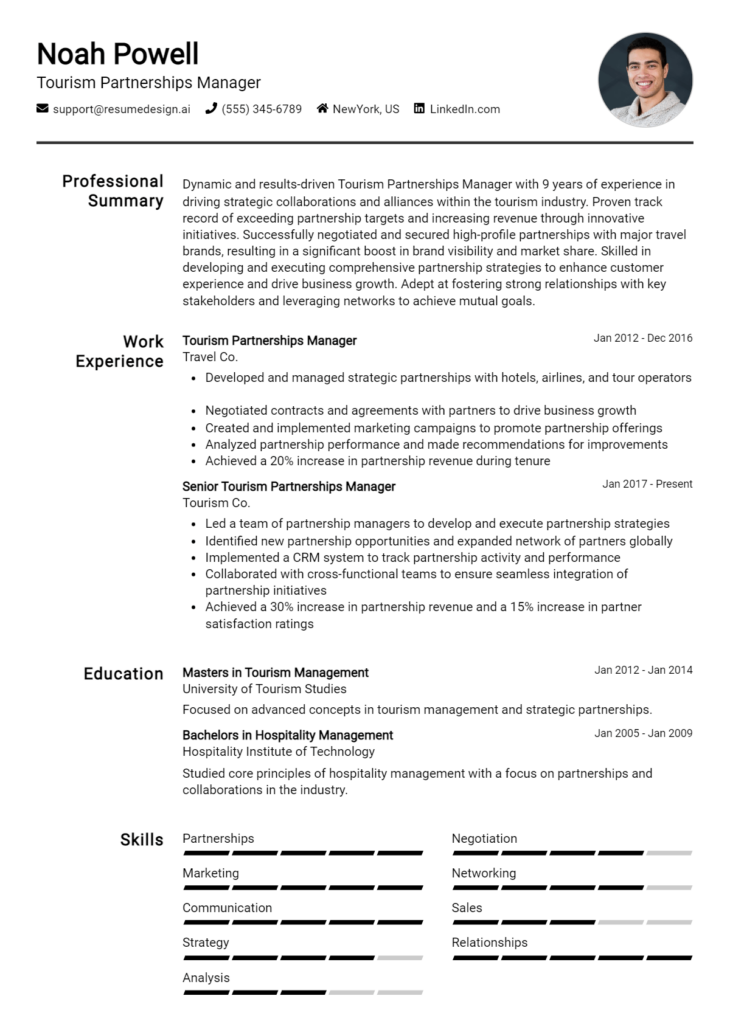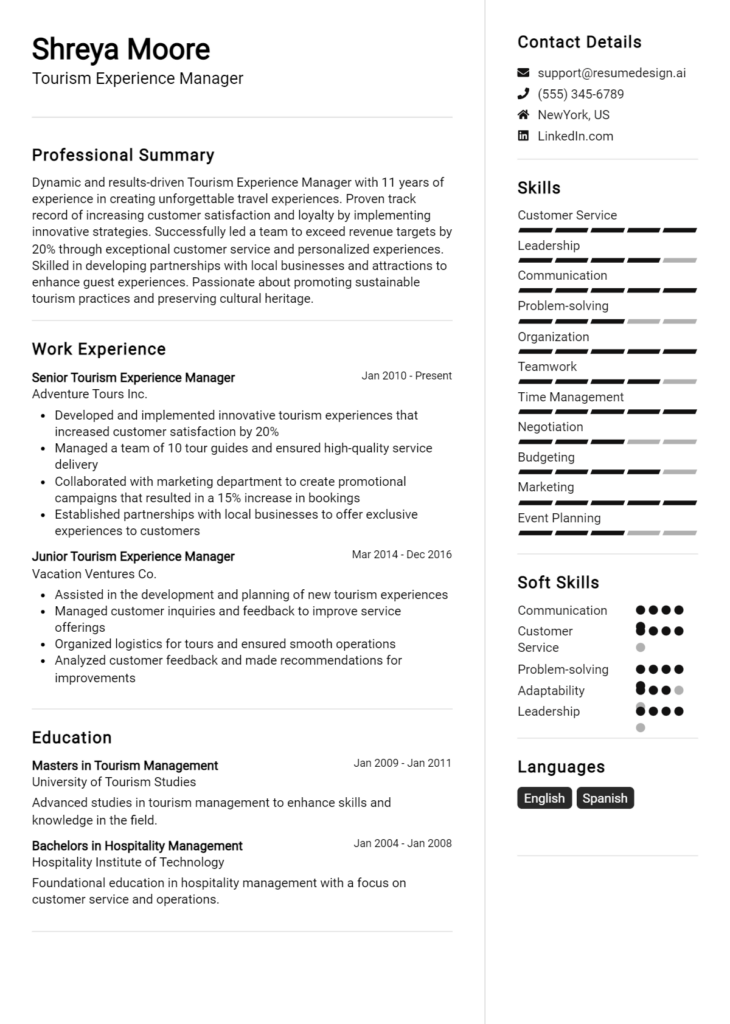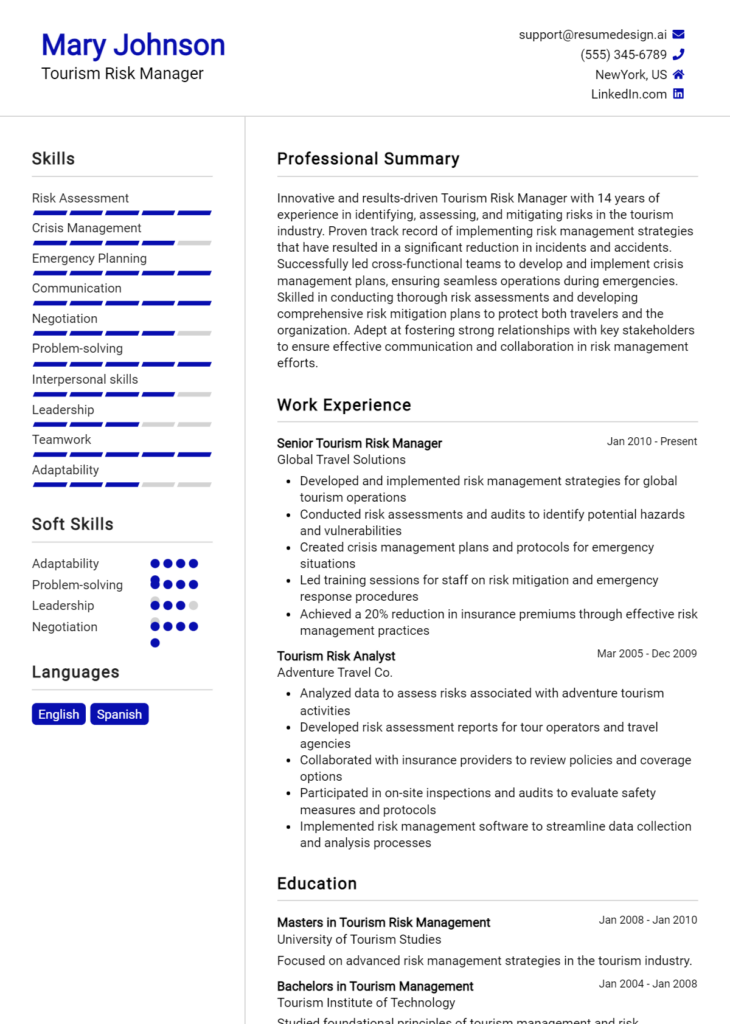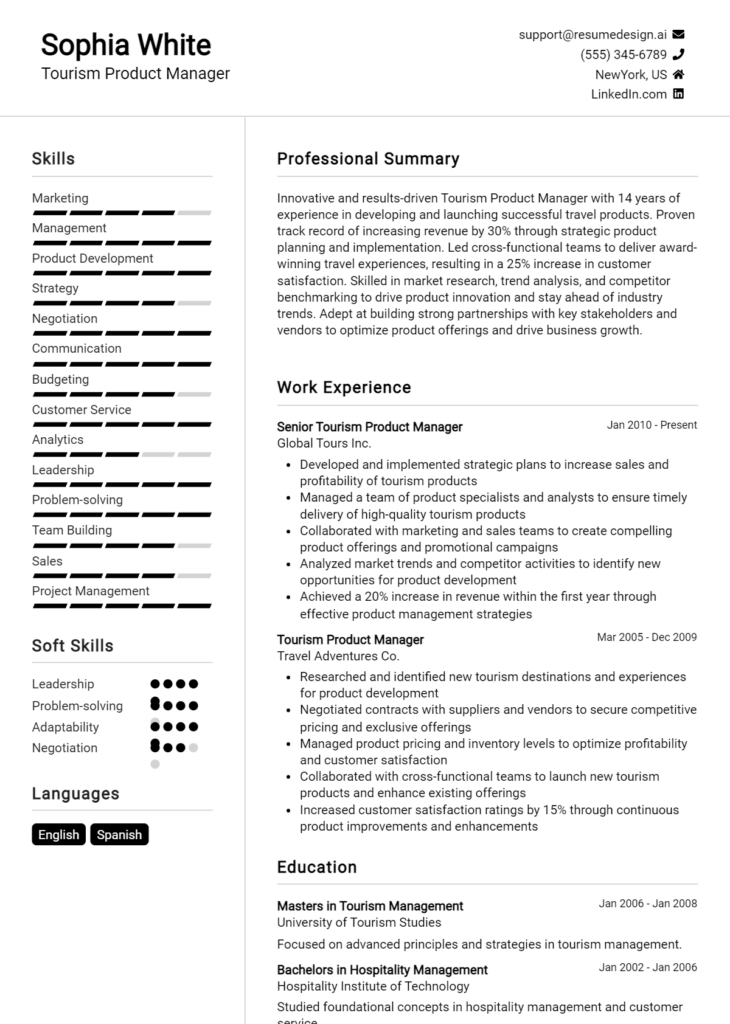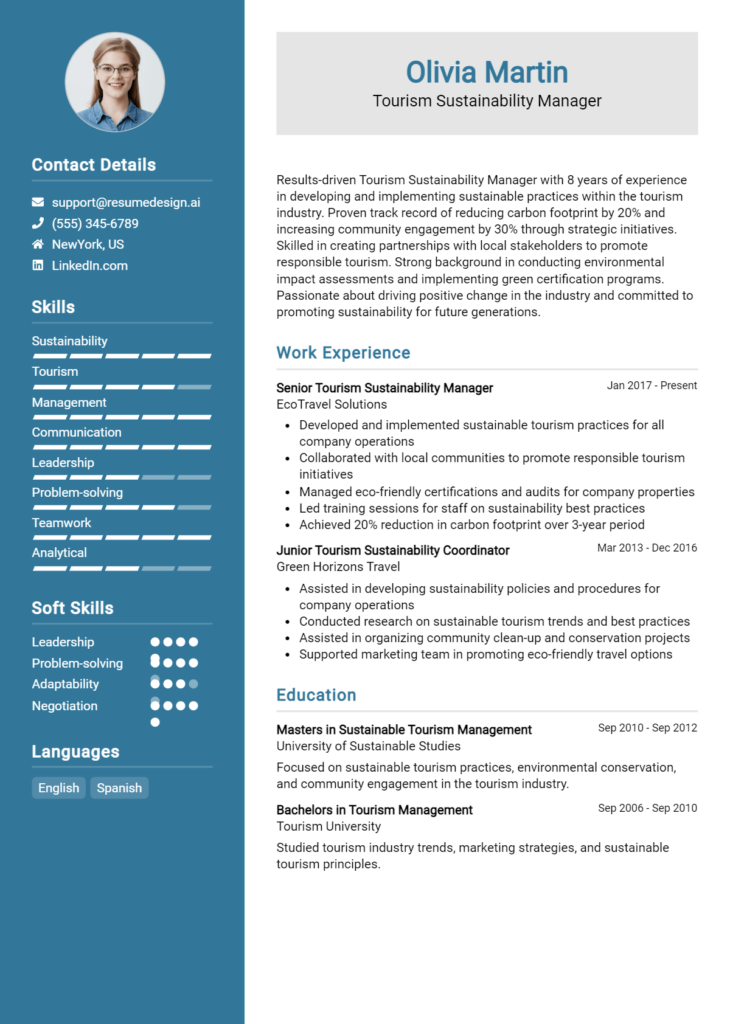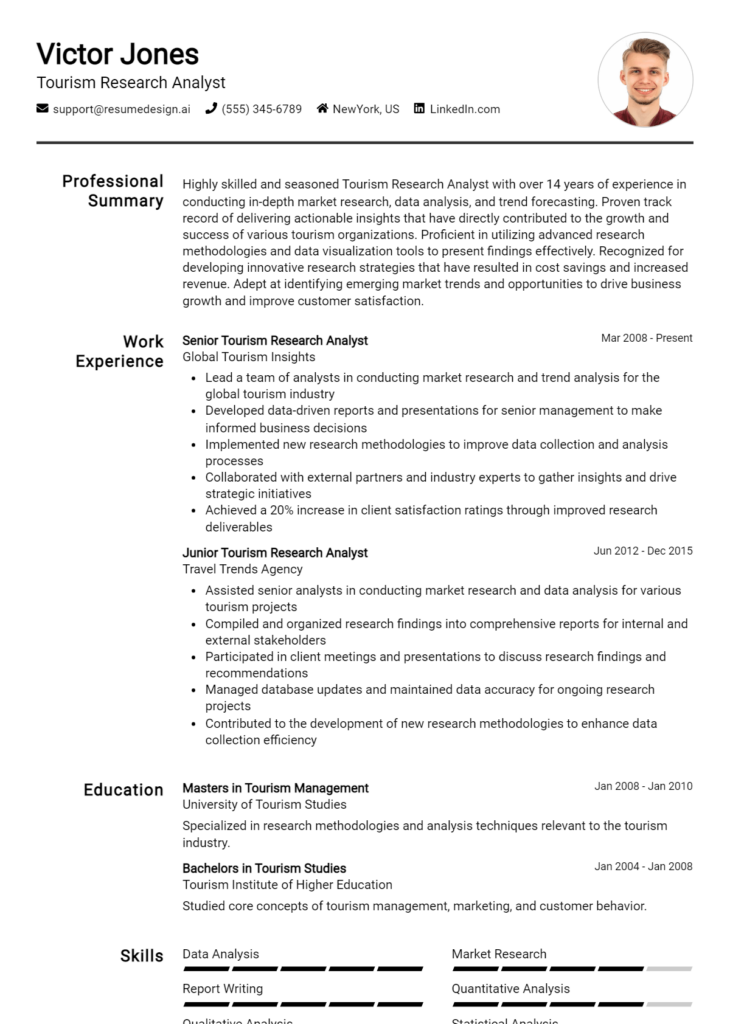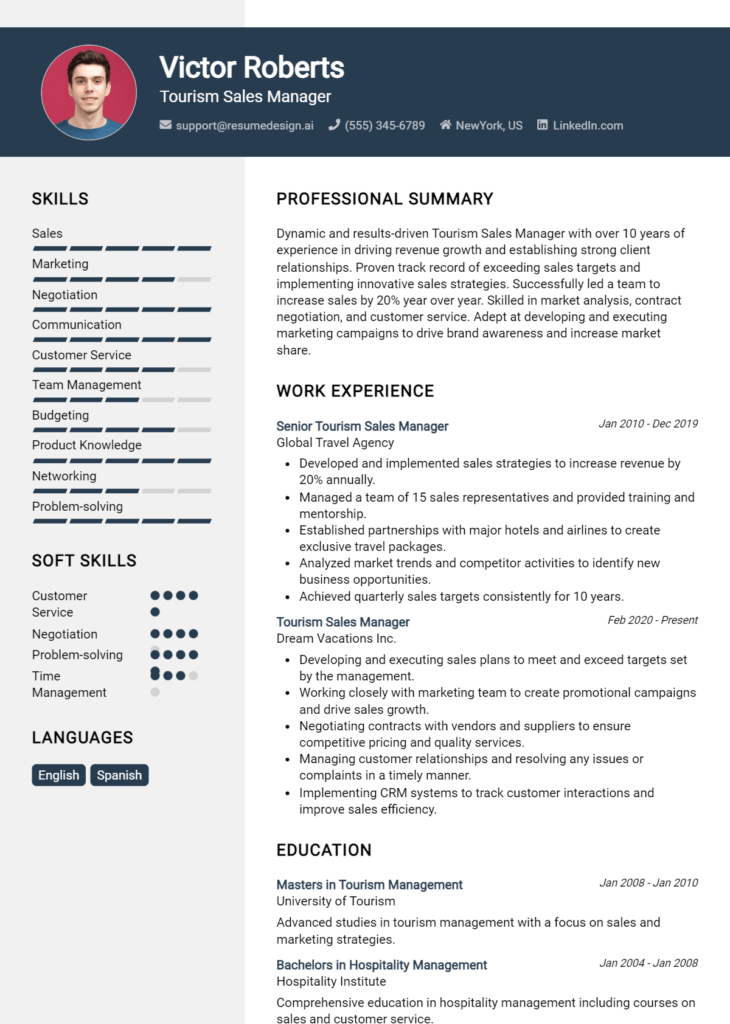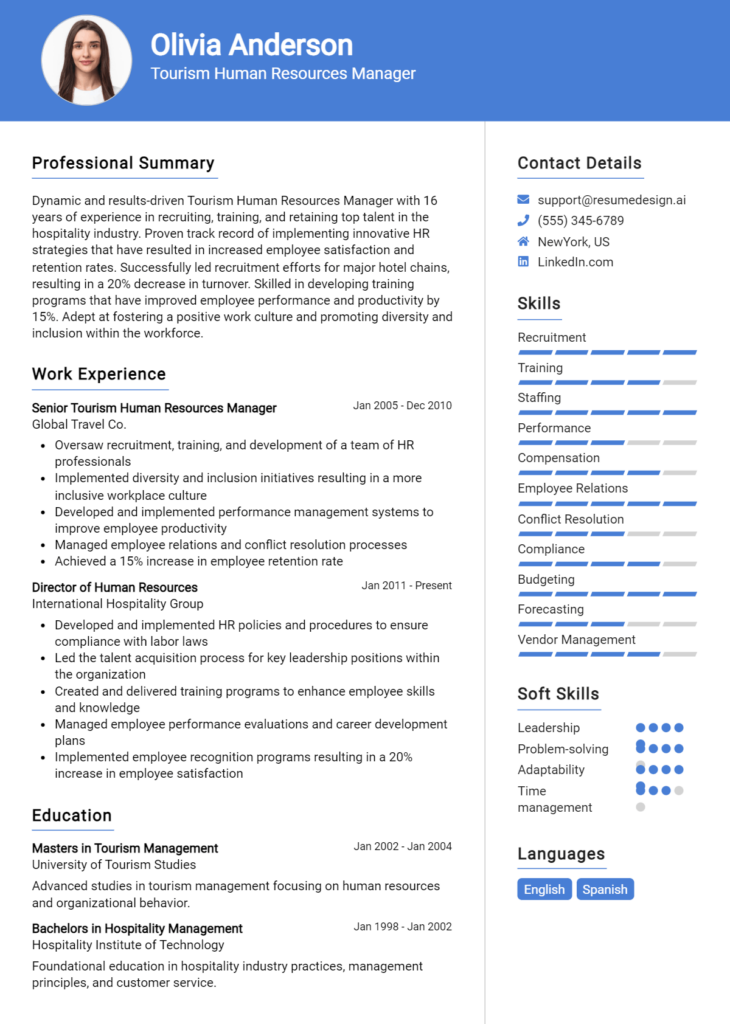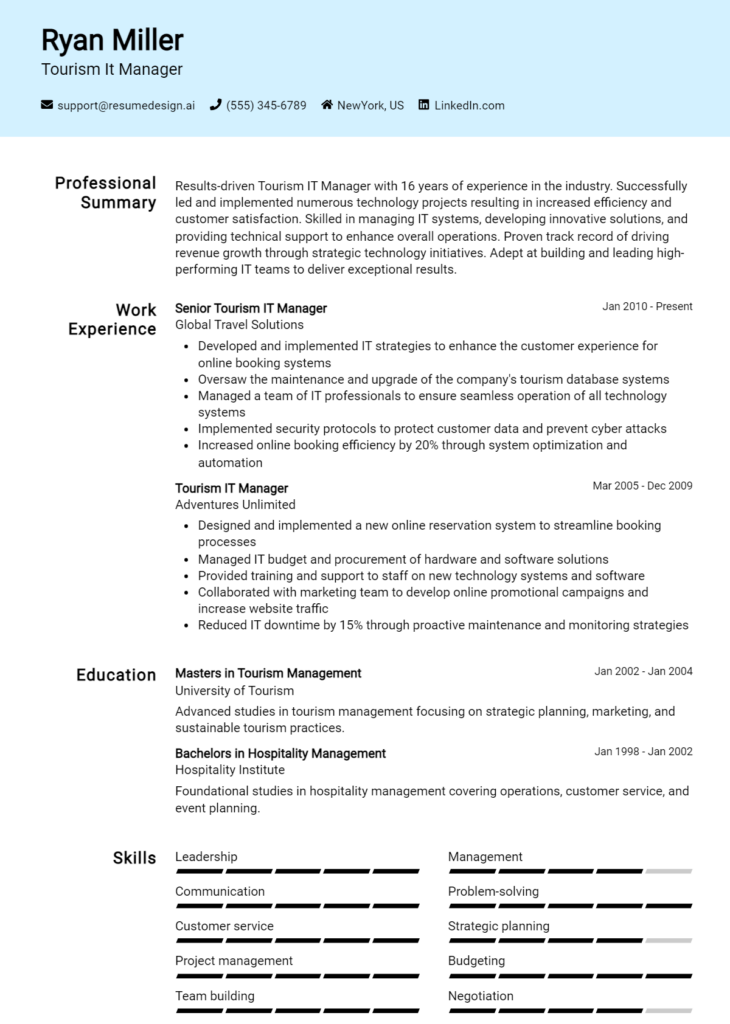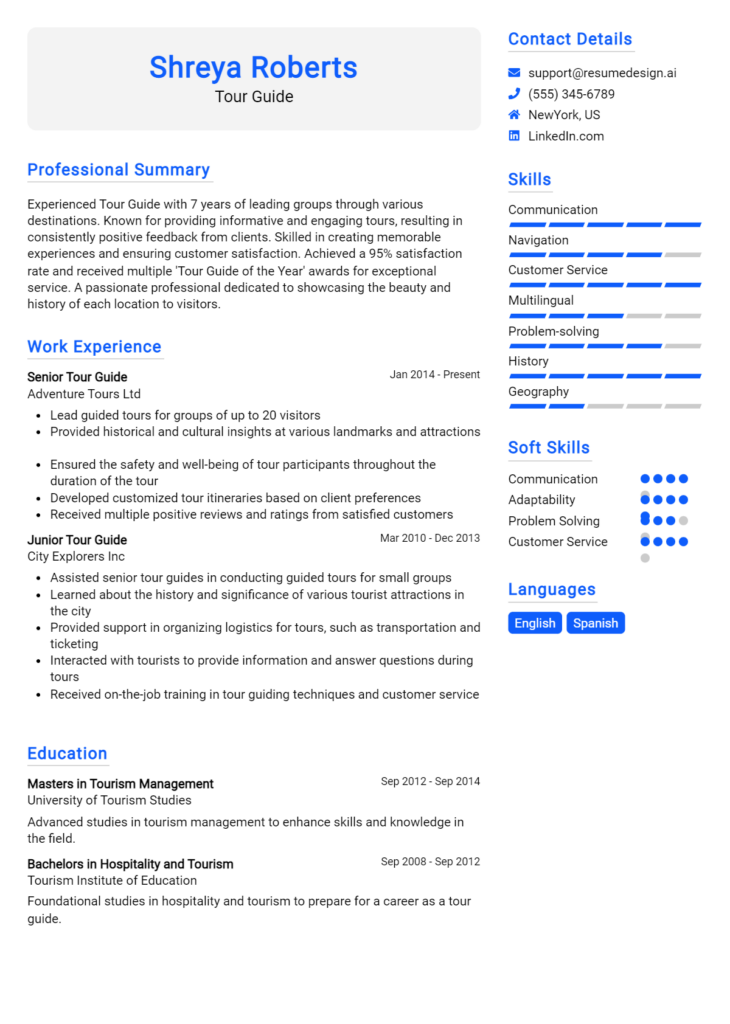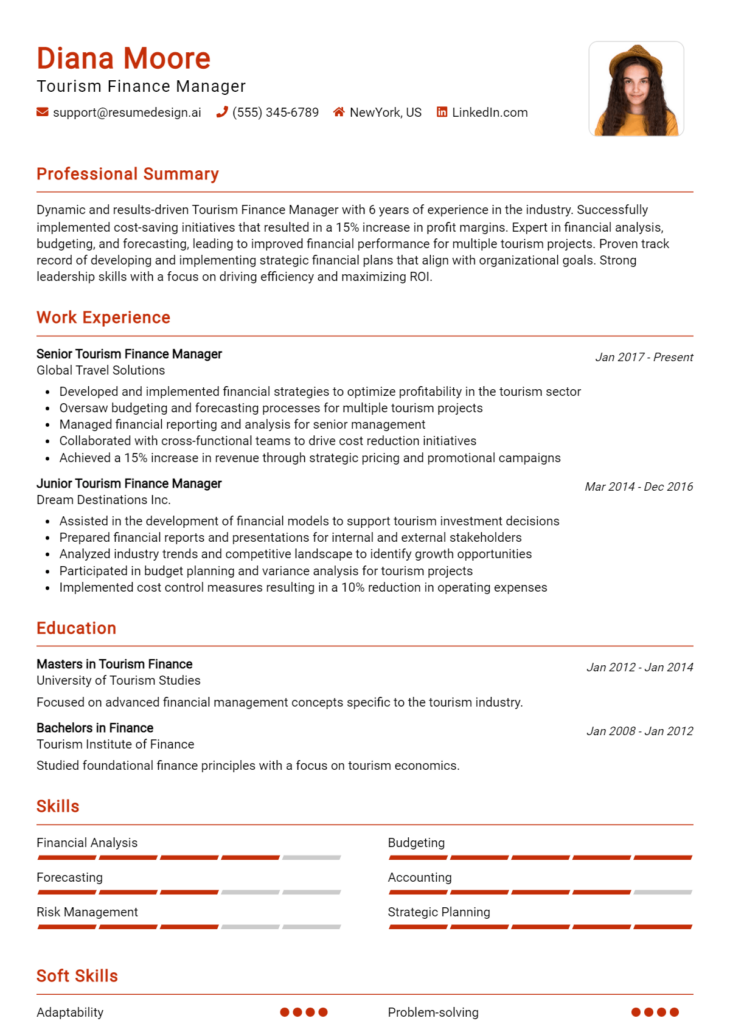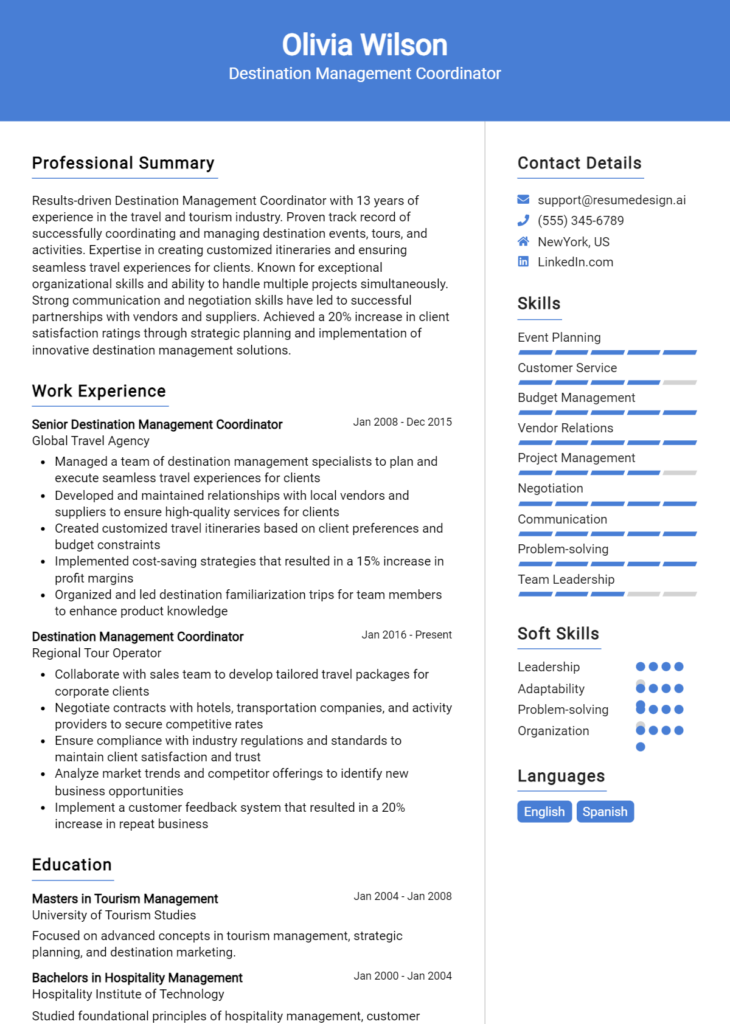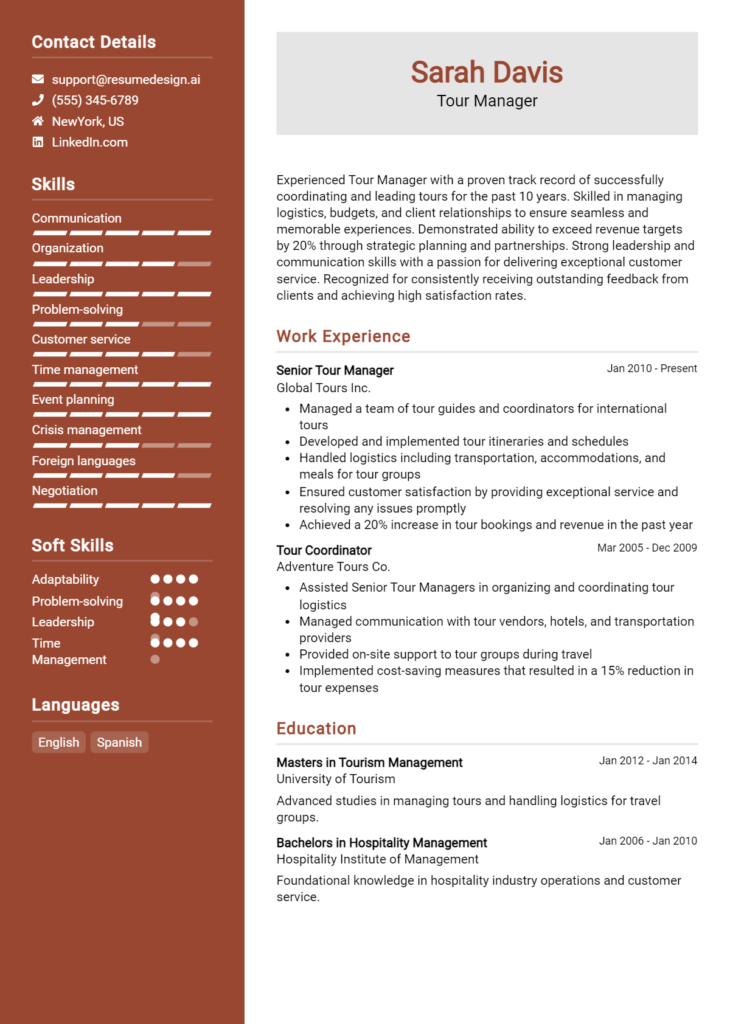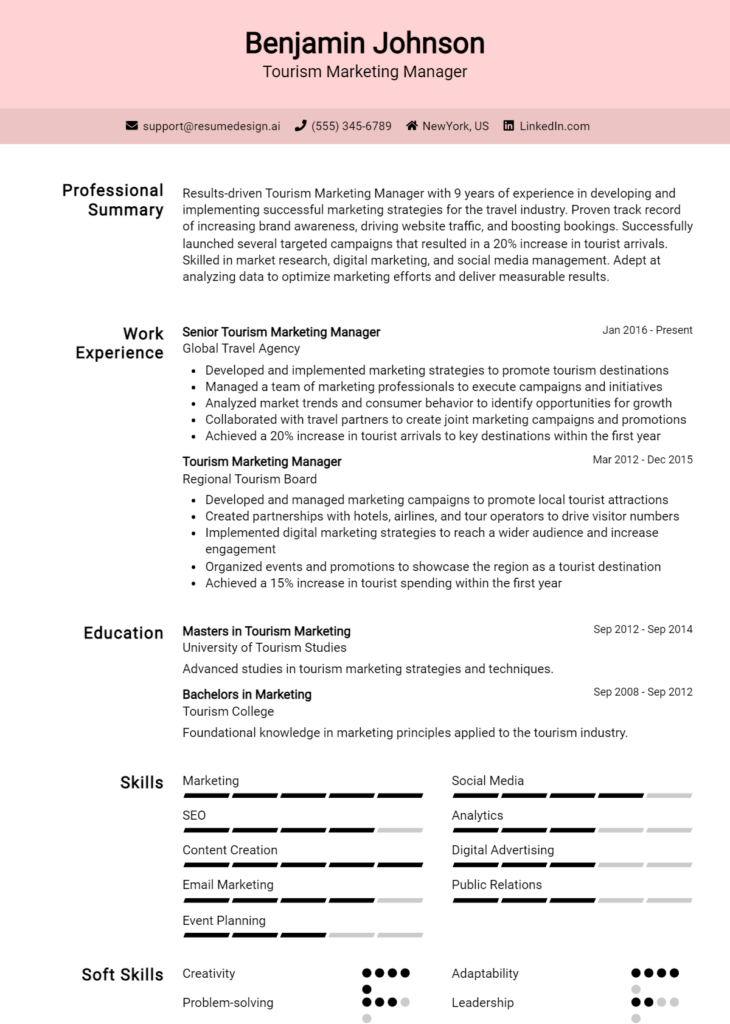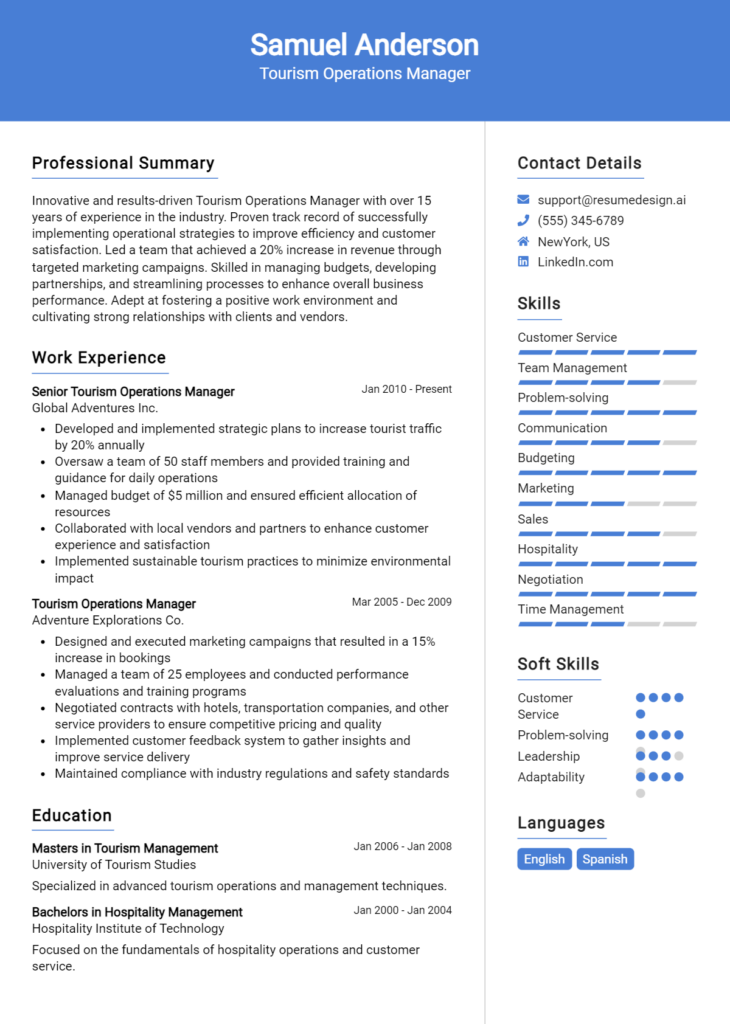Tourism Manager Core Responsibilities
A Tourism Manager plays a crucial role in coordinating various departments, enhancing the travel experience while ensuring operational efficiency. Key responsibilities include developing marketing strategies, managing budgets, and collaborating with local businesses. Essential skills encompass technical proficiency in travel technology, operational oversight, and strong problem-solving abilities. These competencies not only contribute to organizational goals but also elevate customer satisfaction. A well-structured resume effectively highlights these qualifications, showcasing a candidate's potential impact on the tourism industry.
Common Responsibilities Listed on Tourism Manager Resume
- Develop and implement tourism marketing strategies.
- Manage budgets and financial forecasts for tourism projects.
- Collaborate with local businesses and attractions for promotional activities.
- Analyze tourism trends and customer feedback to improve services.
- Coordinate events and activities to enhance visitor experiences.
- Oversee staff training and development in customer service.
- Ensure compliance with safety and regulatory standards.
- Utilize technology for booking systems and data analysis.
- Establish partnerships with travel agencies and tour operators.
- Conduct market research to identify new tourism opportunities.
- Manage social media and online presence to attract visitors.
Why Resume Headlines & Titles are Important for Tourism Manager
In the competitive field of tourism management, a well-crafted resume headline or title serves as a crucial first impression for potential employers. This concise phrase acts as a powerful summary of a candidate's key qualifications, instantly grabbing the attention of hiring managers. A strong headline not only highlights relevant skills and experiences but also aligns with the specific requirements of the job being applied for, making it easier for recruiters to identify top candidates. By ensuring that the headline is relevant, impactful, and succinct, applicants can significantly enhance their chances of standing out in a crowded job market.
Best Practices for Crafting Resume Headlines for Tourism Manager
- Keep it concise: Aim for one impactful phrase or sentence.
- Be specific: Tailor the headline to match the job description and requirements.
- Highlight key achievements: Include quantifiable results or notable accomplishments.
- Use action words: Start with strong verbs to convey confidence and proactivity.
- Showcase relevant skills: Focus on skills that are pertinent to the tourism industry.
- Avoid jargon: Use clear and straightforward language that is easily understood.
- Emphasize your unique value: Distinguish yourself from other candidates with a unique angle.
- Align with company goals: Reflect the values and objectives of the organization you’re applying to.
Example Resume Headlines for Tourism Manager
Strong Resume Headlines
Dynamic Tourism Manager with 10+ Years of Experience in Strategic Planning and Destination Marketing.
Award-Winning Tourism Professional Specializing in Sustainable Travel Solutions and Customer Experience Enhancement.
Results-Driven Tourism Manager with Proven Track Record in Increasing Visitor Engagement by 30% Annually.
Weak Resume Headlines
Tourism Manager Seeking New Opportunities.
Experienced Professional in the Travel Industry.
The strong resume headlines are effective because they are specific, highlight key achievements, and convey a sense of confidence and expertise relevant to the tourism industry. They immediately inform hiring managers about the candidate's strengths and what they can bring to the organization. On the other hand, the weak headlines lack specificity and impact, making them forgettable and ineffective in distinguishing the candidate from others. By failing to communicate unique qualifications or relevant experience, these generic titles do little to engage potential employers.
Writing an Exceptional Tourism Manager Resume Summary
A well-crafted resume summary is essential for a Tourism Manager as it serves as the first impression a hiring manager gets of a candidate. A strong summary quickly captures attention by succinctly showcasing key skills, relevant experience, and notable accomplishments that align with the job role. It acts as a compelling introduction that encourages hiring managers to delve deeper into the resume. Therefore, it is crucial for the summary to be concise, impactful, and tailored specifically to the job being applied for, making the candidate stand out in a competitive field.
Best Practices for Writing a Tourism Manager Resume Summary
- Quantify Achievements: Use numbers and metrics to demonstrate the impact of your work, such as increased visitor numbers or revenue growth.
- Focus on Key Skills: Highlight skills that are particularly relevant to the tourism industry, such as customer service, marketing, and strategic planning.
- Tailor to Job Description: Customize your summary for each job application by incorporating keywords and phrases from the job description.
- Be Concise: Keep your summary to 2-4 sentences to ensure it remains clear and to the point.
- Showcase Industry Experience: Mention years of experience in tourism management or related fields to establish credibility.
- Highlight Leadership Skills: If applicable, emphasize your experience in leading teams or managing projects within the tourism sector.
- Include Relevant Certifications: Mention any tourism or management certifications that can set you apart from other candidates.
- Emphasize Customer Satisfaction: Highlight your commitment to enhancing the customer experience, as this is key in the tourism industry.
Example Tourism Manager Resume Summaries
Strong Resume Summaries
Dynamic Tourism Manager with over 8 years of experience in enhancing visitor engagement, resulting in a 30% increase in annual tourism revenue. Proven expertise in strategic marketing and customer relations within diverse cultural settings.
Results-driven professional with a decade of experience in managing tourism operations and events, successfully increasing guest satisfaction scores by 25% through innovative service strategies and staff training programs.
Accomplished Tourism Manager with a track record of developing sustainable travel programs that boosted eco-tourism participation by 40% in just two years. Skilled in team leadership and cross-functional collaboration.
Weak Resume Summaries
Experienced manager looking for a new opportunity in tourism. I have a variety of skills that could be useful.
Dedicated professional with experience in tourism. I am seeking to apply my skills in a challenging new role.
The examples above illustrate the differences between strong and weak resume summaries. Strong summaries are specific, quantifiable, and directly relevant to the Tourism Manager role, showcasing measurable achievements and industry-related skills. In contrast, weak summaries are vague, lack concrete outcomes, and do not demonstrate a clear understanding of the job or how the candidate can contribute to the organization.
Work Experience Section for Tourism Manager Resume
The work experience section of a Tourism Manager resume is crucial as it serves as a compelling narrative of the candidate's professional journey. This section not only highlights the candidate's technical skills and industry-specific knowledge but also showcases their ability to manage teams effectively and deliver high-quality tourism products and services. By quantifying achievements and aligning experiences with industry standards, candidates can demonstrate their impact on previous organizations, making them more appealing to potential employers.
Best Practices for Tourism Manager Work Experience
- Use action verbs to describe your responsibilities and accomplishments.
- Quantify results with specific metrics, such as revenue growth percentages or customer satisfaction scores.
- Highlight your technical skills relevant to tourism, such as knowledge of booking software or marketing strategies.
- Showcase teamwork and collaboration by mentioning cross-departmental projects or partnerships.
- Tailor your experiences to align with the job description of the position you are applying for.
- Include relevant certifications or training that enhance your qualifications.
- Demonstrate leadership experience by highlighting any managerial roles or projects led.
- Keep descriptions concise and impactful to maintain the reader's interest.
Example Work Experiences for Tourism Manager
Strong Experiences
- Successfully managed a team of 10 tour guides, leading to a 30% increase in customer satisfaction ratings over two years through enhanced training programs.
- Implemented a new booking system that improved operational efficiency by 25% and reduced customer wait times by 15%.
- Coordinated a marketing campaign that resulted in a 40% increase in bookings during the off-peak season, contributing to a 20% growth in annual revenue.
- Developed partnerships with local businesses that expanded our service offerings, leading to a 50% increase in package sales.
Weak Experiences
- Worked on various projects related to tourism management.
- Helped improve customer service in some areas.
- Assisted in organizing events occasionally.
- Participated in team meetings to discuss tourism strategies.
The strong experiences are effective because they provide specific, quantifiable outcomes that clearly demonstrate the candidate's impact and expertise in tourism management. They highlight leadership, technical skills, and successful collaboration. In contrast, the weak experiences lack detail and measurable achievements, making them less compelling and failing to showcase the candidate's true capabilities in the industry.
Education and Certifications Section for Tourism Manager Resume
The education and certifications section of a Tourism Manager resume plays a critical role in showcasing a candidate's academic background and their commitment to professional development. This section not only highlights relevant degrees and industry-recognized certifications but also emphasizes continuous learning efforts, which are essential in an ever-evolving tourism landscape. By detailing relevant coursework, certifications, and specialized training, candidates can significantly enhance their credibility and demonstrate their alignment with the specific demands of the Tourism Manager role.
Best Practices for Tourism Manager Education and Certifications
- Focus on relevant degrees such as Tourism Management, Hospitality, or Business Administration.
- Include industry-recognized certifications, such as Certified Travel Associate (CTA) or Certified Meeting Professional (CMP).
- Detail relevant coursework that aligns with the skills required for a Tourism Manager.
- Highlight any specialized training programs that showcase expertise in areas like sustainable tourism or destination marketing.
- List your educational credentials in reverse chronological order, starting with the most recent.
- Be specific about the credentials obtained, including dates and institutions.
- Consider adding any professional development courses or workshops attended.
- Tailor the content to match the job description and emphasize any unique qualifications.
Example Education and Certifications for Tourism Manager
Strong Examples
- Bachelor of Science in Tourism Management, University of XYZ, 2020
- Certified Travel Associate (CTA), Travel Institute, 2021
- Coursework in Sustainable Tourism Practices, 2019
- Certificate in Destination Marketing, ABC Institute, 2022
Weak Examples
- Bachelor's Degree in English Literature, University of ABC, 2018
- Generic Business Certificate, Online Learning Platform, 2020
- High School Diploma, XYZ High School, 2016
- Outdated Certification in Event Planning, 2015
The examples categorized as strong demonstrate a direct relevance to the role of a Tourism Manager, showcasing degrees and certifications that are specifically tailored to the tourism industry. In contrast, the weak examples highlight qualifications that are either unrelated or outdated, failing to align with the current demands of the tourism sector. Strong educational backgrounds and certifications not only enhance a candidate's profile but also indicate a proactive approach to career development in tourism management.
Top Skills & Keywords for Tourism Manager Resume
A well-crafted resume is essential for a Tourism Manager, as it serves as a critical tool in showcasing the unique blend of skills required to excel in this dynamic field. Skills not only highlight a candidate's qualifications but also demonstrate their capacity to navigate the complexities of the tourism industry, from managing diverse teams to enhancing the customer experience. In a competitive job market, a strong emphasis on relevant skills in your resume can set you apart from other candidates, illustrating your readiness to tackle the challenges of the role and contribute to the growth of the organization.
Top Hard & Soft Skills for Tourism Manager
Soft Skills
- Communication Skills
- Leadership Abilities
- Customer Service Orientation
- Team Collaboration
- Problem-Solving Skills
- Adaptability and Flexibility
- Time Management
- Cultural Awareness
- Negotiation Skills
- Conflict Resolution
Hard Skills
- Knowledge of Travel Management Systems
- Budgeting and Financial Planning
- Marketing Strategies for Tourism
- Data Analysis and Reporting
- Event Planning and Coordination
- Knowledge of Local Regulations and Compliance
- Geographic Information Systems (GIS)
- Booking and Reservation Systems
- Social Media Management
- Proficiency in Multiple Languages
By emphasizing these skills in your resume, alongside your work experience, you can effectively portray your qualifications as a Tourism Manager and increase your chances of landing your desired position.
Stand Out with a Winning Tourism Manager Cover Letter
I am writing to express my enthusiasm for the Tourism Manager position at [Company Name] as advertised on [where you found the job listing]. With a proven track record of successfully managing tourism projects and enhancing visitor experiences, I am excited about the opportunity to contribute to your organization’s growth and reputation in the travel industry. My extensive background in destination marketing, stakeholder collaboration, and community engagement has equipped me with the skills necessary to create memorable experiences for visitors while promoting sustainable tourism practices.
In my previous role as a Tourism Coordinator at [Previous Company Name], I successfully launched several marketing campaigns that increased visitor engagement by over 30% within a year. By leveraging social media platforms and collaborating with local businesses, I was able to develop a cohesive brand identity that resonated with a diverse audience. My ability to analyze tourism trends and adapt strategies accordingly has consistently resulted in increased foot traffic and visitor satisfaction. I am excited to bring my innovative approach to [Company Name], where I believe my proactive mindset will align perfectly with your mission to enhance tourism experiences.
Furthermore, I have a strong foundation in building relationships with local stakeholders, including government organizations, business owners, and community groups. By fostering these partnerships, I have successfully organized events that not only attracted visitors but also highlighted the unique cultural heritage of the region. I am passionate about promoting sustainable tourism practices and ensuring that tourism development benefits both visitors and the local community. I am keen to apply this passion at [Company Name], where I believe that my skills can help advance your commitment to responsible tourism.
I am excited about the opportunity to join [Company Name] as a Tourism Manager and contribute to the continued success of your tourism initiatives. I look forward to the possibility of discussing how my experience and vision align with your goals. Thank you for considering my application. I hope to bring my expertise in tourism management to your esteemed organization and help elevate [Company Name] as a premier travel destination.
Common Mistakes to Avoid in a Tourism Manager Resume
Crafting an effective resume as a Tourism Manager requires attention to detail and a clear presentation of relevant skills and experiences. Many candidates, however, make common mistakes that can hinder their chances of landing an interview. Understanding these pitfalls can help you create a more compelling and professional resume that stands out to potential employers in the competitive tourism industry.
Generic Objective Statement: Using a one-size-fits-all objective can make your resume blend in with others. Tailor your statement to reflect your specific goals and how they align with the position you're applying for.
Lack of Quantifiable Achievements: Failing to include specific metrics or achievements can weaken your resume. Highlight accomplishments such as increased visitor numbers or enhanced customer satisfaction scores to demonstrate your impact.
Overloading with Irrelevant Experience: Including unrelated job experiences can clutter your resume. Focus on relevant positions and skills that directly pertain to tourism management to keep the content concise and targeted.
Ignoring Keywords from the Job Description: Not incorporating industry-specific keywords can lead to your resume being overlooked by Applicant Tracking Systems (ATS). Analyze the job posting for essential terms and integrate them naturally into your resume.
Poor Formatting and Readability: A cluttered or overly complex format can make your resume difficult to read. Use clear headings, bullet points, and consistent font styles to enhance readability and professionalism.
Neglecting Soft Skills: While technical skills are important, tourism management also relies heavily on soft skills such as communication, leadership, and customer service. Be sure to articulate these skills effectively in your resume.
Failing to Customize for Each Application: Sending out the same resume for every job can be detrimental. Tailor your resume for each application to address the specific requirements and culture of the organization.
Not Proofreading: Spelling and grammatical errors can create a negative impression. Always proofread your resume carefully, or have someone else review it to catch any mistakes before submission.
Conclusion
As a Tourism Manager, your role is pivotal in shaping the travel experience for visitors and ensuring the sustainability of tourism destinations. Key responsibilities include developing tourism strategies, managing marketing campaigns, collaborating with local businesses, and enhancing visitor engagement. Additionally, you must stay updated on industry trends, maintain strong relationships with stakeholders, and ensure compliance with regulations.
In conclusion, a well-crafted resume is essential to showcase your skills and experiences effectively. Take a moment to review your Tourism Manager resume and ensure it highlights your achievements and abilities. To assist you in this process, consider utilizing valuable resources such as resume templates, a user-friendly resume builder, insightful resume examples, and tailored cover letter templates. Elevate your job application today and take the next step in your tourism career!

